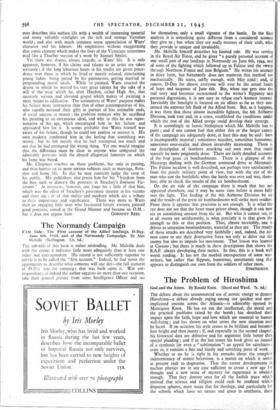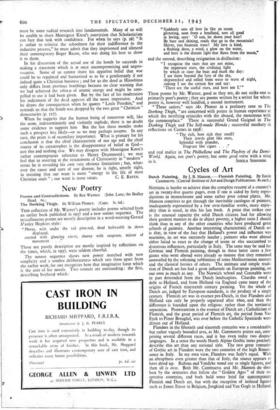The Problem of Hiroshima
God and the Atom. By Ronald Knox. (Sheed and Ward. '78. 6c1.) THE debate about the unannounced use of atomic energy to destroy Hiroshima—a debate already raging among our quicker and more implicated cousins across the Atlantic—is admirably opened by Monsignor Knox. He has set out the intellectual, the moral and the practical problems raised by the bomb ; has sketched their impact upon the faith, hope and love which are essential to human well-being ; and has shown on what terms the new situation may be faced. If on occasion his style ceases to be brilliant and becomes first bright and then jaunty ; if, and especially in the second chapter, his historical data are defective and his argument little better than special pleading ; and if in the last resort his book gives us instead of a synthesis (or even a " sublimation ") an appeal for saintliness ; even so, it remains a fine and timely and searching piece of work. Whether or no he is right in his remarks about the complete indeterminacy of atomic behaviour, is a matter on which it seems at present rash to dogmatise. That the recent developments in nuclear physics are in any case sufficient to create a new age for thought and a new sense of mystery for experience is obvious enough. That they destroy once for all the foolish truce which insisted that science and religion could each be confined within disparate spheres, must mean that for theology, and particularly for the schools which have set nature and grace in antithesis, there must be some radical research into fundamentals. Many of us will be unable to share Monsignor Knox's conviction that Scholasticism can face that task with confidence. For when he says (p. 26) " It is unfair to criticise the schoolmen for their indifference to the inductive process," he must admit that they imprisoned and silenced their contemporary Roger Bacon, who was doing his best to show it to them.
In his discussion of the actual use of the bomb he succeeds in making a statement which is at once uncompromising and unpro- vocative. Some of us cannot share his appafent belief that war could be so regulated and humanised as to be a gentlemanly if not indeed quite a Christian business ; and for us the deed at Hiroshima only differs from previous bombings because no clear warning that we had achieved the release of atomic energy and might be com- pelled to use it had been given. But by the fact of his moderation his indictment of the dezd appears all the more impressive. And he draws the consequences when he quotes " Little Peterkin," and reminds us that the bomb was dropped by the two great " Christian " democracies (p. 117). When he suggests that the human being of tomorrow will, like the atom, indeterminately and violently explode, there is no doubt some evidence to support him But the last three months make such a prospect less likely—or so we may perhaps assume. In any case, the point is of secondary importance. What is primary for his conclusion is that the chief characteristic of our age and the chief source of its catastrophes is the disappearance of belief in God— just this and nothing else. We may disagree with Monsignor Knox's rather contemptuous reference to Henry Drummond ; we may feel that in sneering at the restatement of Christianity in " modern " terms he is revealing his own very obvious limitations ; but, what- ever the cause and cure of our disease, he is right, utterly right, in insisting that our want is more " energy in the life of most
Christian souls " ; our want is more saints. C. E. RAVEN.































 Previous page
Previous page